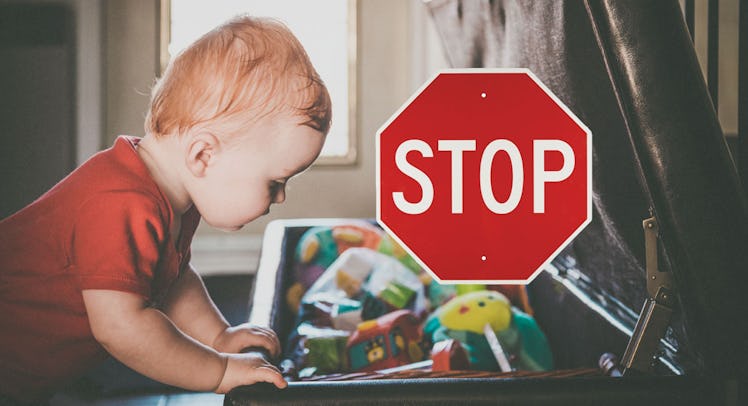Babies and Toddlers Don’t Need Toys
Why buy toys when your kids can play with rocks for free?

One of my main jobs as a new parent, or so I thought, was taking dangerous objects away from my children and replacing them with shiny plastic objects in which they had zero interest. My baby boys would prefer to sit in the dirt and explore rocks. This, I thought, was just part of parenting. I assumed babies simply had no aesthetic taste or sense of self-preservation. That’s why they liked picking up splintery hunks of wood with their grubby fists and jamming them into their sticky mouths rather than the reasonable BPA-free baubles that lit up and made noises. I figured it was my job, as their father, to orient them to the best baby toys that provided a foundation for their development.
I should have let them play with the rocks.
The world was telling me that babies need stuff in order to become fully-functioning humans. That idea was inculcated by baby registries and Facebook ads for developmental toys that told me how my kid wasn’t going to grow without perfectly engineered toys. To learn to kick, roll over, and coordinate their limbs, they required a play mat connected to a dome hung with dangling monkeys. To develop their senses they required a soft book with pages that crinkled, squeaked, and had mirrors. To promote curiosity they needed rattles and toy pianos with cartoon characters that popped up when the keys were pushed.
Of course, I now know, this is all bullshit.
Toys for babies and toddlers aren’t bad. They can even be fun and something to bond with your kid over. But they’re also not necessarily any better than, well, rocks. Just look across the globe where babies grow just fine without the typical Western toys that litter the gift table at the average American baby shower. There are babies for whom a stick and an inflated goat bladder provides all the joy the could ever need. There are kids who build their own toys out of discarded wire. There are toddlers that learn to walk without a play center that they can push around in front of them. There are babies who grow into content productive adults having grown up playing with rocks.
From an infant development perspective, this makes a ton of sense. If babies really required toys in order to grow and develop we would have never evolved as a species. Babies are wildly resilient. The fact is that they can and will grow anywhere, in a startlingly diverse range of climates, cultures, and socioeconomic circumstances.
When my boys were babies, they would have grown up just fine playing with rocks. They would have received all the benefits that other toys claim to provide. Hefting rocks would have made them strong. Putting rocks in their mouth would have provided benefits to their immune system. Different types of rocks, with their various textures, colors, and shapes would have provided infinite opportunities for exploration. That’s the case now, I can’t see why it would have not been the case when they were mere months old. It’s clear that I didn’t need to buy my kids’ toys for the first three years of their life.
You see, if we as parents could all just agree that we don’t need to buy babies presents, we could be free. We could all be free. And our babies would be no less happy or well developed for it.
If we could all agree that our kids need only rocks, carpet remnants, sticks, wire, softly sanded blocks of wood, discarded keys, parenting would get so much cheaper. For those parents who would feel guilty without making an effort, they could go to the hardware store and buy a variety of latches to attach to a board. Our babies will grow just fine.
Of course, I know the toyless baby utopia I’ve envisioned will never come to pass. It’s too impractical and also there are some really cool toys out there for toddlers — the temptation for parents is too great. That said, there’s no need for parents to knock the rock out their baby’s hand. Instead, consider that one less toy you have to buy later.
This article was originally published on